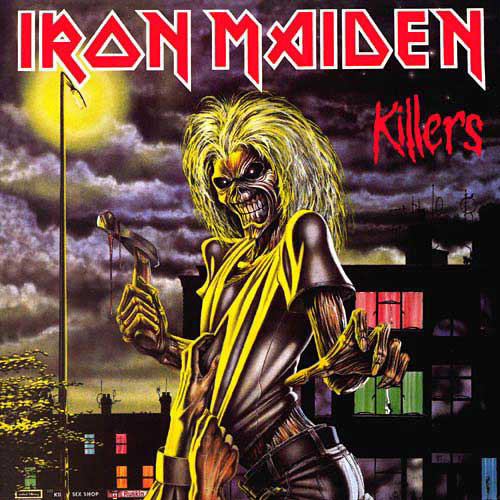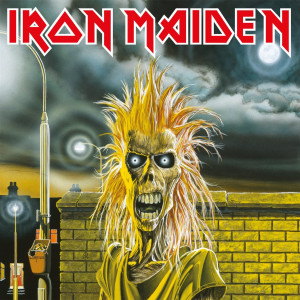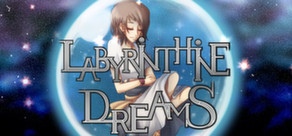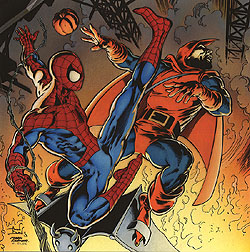
The Number of the Beast (1982)
If you have only limited knowledge of Iron Maiden, this album (and its title song) are what you are likely most familiar with. This album, widely considered one of the greatest, if not the greatest, in Metal history was a phenomenal success worldwide. Fans consider it to be the beginning of the band's "golden age," a series of superb albums that continues throughout the rest of the 1980s. Part of this album's success came from the controversy around its use of Satanic vocabluary, but more on that later.
After the departure of vocalist Paul Di'Anno, the band chose someone with a radically different voice. Dramatic tenor Bruce Dickinson could shriek like few others, earning him the nickname "the Air Raid Siren." Iron Maiden had been putting out exciting metal from day one, but Bruce's voice adds a whole new level of drama. The music began to adjust accordingly - the songs began to get longer and the lyrics began to branch far beyond the tales of street violence that characterized most of the last two albums. You can make a convincing argument that the seeds of the subgenre that became "power metal" were planted with The Number of the Beast.
Drummer Clive Burr, whose work on this album is simply brilliant, would leave the band before the next album emerged. He was later diagnosed with multiple sclerosis, and medical costs left him bankrupt. Iron Maiden's members are still close with Burr and they have staged multiple charity concerts on his behalf. His plight brought attention to MS within the metal community and the "Clive Aid" charity still works to raise funds for various MS-related programs around the world.
Given this album's formidable reputation, I'm still shocked at how much I dislike the first track. "Invaders," about the Viking conquests, is so cheesy that it borders on Spinal Tap territory. The verses go so fast that Dickinson barely has time to enunciate anything, and the chorus is impossible to take seriously. Bruce sings "In-VAY-ders!" and then there's a dinky little riff, followed by a shout of some Viking-relating gerund like "Pillaging!" It's not the worst track Iron Maiden ever made (those will come much later in this series), but it's pretty damn bad.
Things improve in a BIG way with "Children of the Damned." Based on the vintage horror film, this song features absolutely face-melting vocals by Dickinson. All of the instruments are in top-form, but this song is undeniably a vocal showcase, treating the listener to a pro singer at the top of his game. At one point, he holds a note for a good 20 seconds. If you think that doesn't sound like much, try it sometime. One more thing to note about this song - it's the first example of what I'll call the "repetition problem," an ongoing complaint from some people about Maiden songs which use the same phrase or phrases repeatedly to make up the chorus. In this case, it's "Children of the Damned" four times in a row, but it works just fine. This issue will come up many times over the course of this series, however.
Next is "The Prisoner," inspired by a 1960s British TV mini-series that the band were huge fans of. Iron Maiden even secured the permission of co-creator and star Patrick McGoohan to use audio from the series in the song's introduction. According to Maiden lore, the band was star-struck during a fateful phone call and babbled incoherently about their plans to pay tribute to the show. "A heavy metal band, you say?" McGoohan replied, before taking a dramatic pause. "Do it!" The song is an uplifting anthem about individuality and defiance that requires no knowledge of the show to appreciate. The solo is amazing too.
"22 Acacia Avenue" is a song I never really "got." It's the second installment of the "Charlotte the Harlot" saga. It seems like a song that was written for Di'Anno and lyrically, it's just as goofy as its predecessor (the line "it's no life for you, stop all this screwin'" always makes me laugh). This song has some ardent fans, but I guess I'm not seeing what they are.
From the ominous opening narration to Dickinson's legendary shriek, "The Number of the Beast" is one of the most famous songs in metal history. Indeed, all the pieces are in place - the twin-guitar assault, Steve Harris's busy bassline and Burr's dynamic drumming. It's popularity is well deserved, though most serious Iron Maiden fans will tell you that they enjoy the song, but feel that there is much better work to be found on this album and in the band's career as a whole. Kinda like how very few Metallica fans feel "Enter Sandman," while classic, is the band's best song.
This song inspired a wave of protests from the Christian Right following its 1982 debut, with many gathering to burn records and sentence all metal fans to eternal damnation. Let's be clear - anyone who actually thinks this song endorses Satanism is a moron who is only taking the song's name at face value and not bothering to read the lyrics, which make it clear Satan is something to be feared, not worshipped. It was inspired by a nightmare Steve Harris had after watching The Omen. Are we still allowed to talk about our nightmares? Is that okay with you? Well if it's not, too fucking bad. In the end, they shot themselves in the foot with this whole incident. Young listeners everywhere said "Hey, you don't get to tell me what music I can or can't listen to!" and thus a huge amount of new fans were introduced to the band and inspired other groups like Slayer to follow suit, after realizing that pissing off these so-called moral guardians was both easy and profitable.
 "Run to the Hills" is another all-time classic, and it's appeal is best summed up by a coundtown of the great hard rock/metal songs aired on VH1. "Everything about that song is impossible," said music critic Steve Huey. "The drums are impossibly fast, the bass playing will give you tendonitis, and the chorus has impossibly high notes." A brutal account of the Native American genocide, the song is a four minute blast of pure metal that retains its ability to stun listeners (and the fact that it was turned into a laughably difficult song on Rock Band on ALL the instruments led to a whole different sort of appreciation). Wisely, Maiden never really tried to out-do this song in terms of speed. A few come close (we'll get to "The Trooper" and "The Evil That Men Do" in future entries), but the band could hardly be called a one-trick pony...many other tricks were up their sleeves.
"Run to the Hills" is another all-time classic, and it's appeal is best summed up by a coundtown of the great hard rock/metal songs aired on VH1. "Everything about that song is impossible," said music critic Steve Huey. "The drums are impossibly fast, the bass playing will give you tendonitis, and the chorus has impossibly high notes." A brutal account of the Native American genocide, the song is a four minute blast of pure metal that retains its ability to stun listeners (and the fact that it was turned into a laughably difficult song on Rock Band on ALL the instruments led to a whole different sort of appreciation). Wisely, Maiden never really tried to out-do this song in terms of speed. A few come close (we'll get to "The Trooper" and "The Evil That Men Do" in future entries), but the band could hardly be called a one-trick pony...many other tricks were up their sleeves."Gangland" kicks off with an awesome drum solo from Burr and makes for a very fun listen overall. With its story of gang violence, it was probably written for Di'Anno but Dickinson manages to make it his own. This song seems to have a weak reputation among the band's fandom at large, but I've always enjoyed it.
"Total Eclipse," a dark story of environmental devastation, was originally left off the album but later restored on a 1990s re-release. Listening to it today with a knowledge of Iron Maiden's later work makes it feel way ahead of its time. It may be the first time the band lent their voice to a current issue, and the progressive elements hint at some of the experimentation that would come in later albums. The mournful section that starts about 3 minutes in is a highlight.
As good as most of these songs are, none of them can match the epic grandeur of the album's final track, "Hallowed Be Thy Name." Most Maiden fans consider this song to be not just the crown jewel of the album, but the band's finest work and arguably the greatest metal song ever written. A tale of a man whose religious convictions are put to the test as his faces his own death, the genre had never seen anything with this much sheer power. The long instrumental section likely represents the protagonist's soul leaving his body and facing the great beyond, and what exactly is meant by the song's final invocation of the Lord's Prayer is left to the listener. The whole band is at the top of their game, but special attention needs to be given to Dickinson and especially Burr. With its elaborate drum fills, this song was the perfect way for him to go out. One final thing to note - whenever I make CDs or ITunes playlists featuring Iron Maiden, this song is always last. Why? Because nothing can follow it.
_________________________________________
Overall Strengths: The album is a bona fide milestone and features several of Iron Maiden's best and most beloved songs.
Overall Weaknesses: Some songs make it clear this is still a band in transition. "Invaders" is just bad.
Recommended Tracks
Children of the Damned
The Prisoner
Run to the Hills
Hallowed Be Thy Name
Next: Nicko McBrain takes over on drums and the classic line-up is complete for "Piece of Mind."







